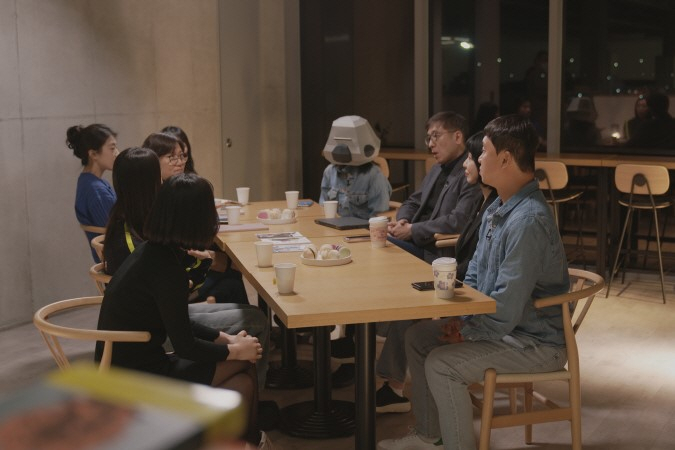7 novelists explore creativity with ChatGPT in 'Manifesto'
By Hwang Dong-heePublished : May 2, 2023 - 19:13

Since ChatGPT was first released in November 2022, many have expressed concerns, though some believe that creativity remains a uniquely human domain.
Amid the flood of writing now out related to ChatGPT, a collection of short stories co-authored by the chatbot and seven sci-fi writers -- Kim Dal-young, Nappelganger, Shin Jo-ha, Oh So-young, Yoon Y. K., Jeon Yun-ho and Chae Kang D. -- hit the shelves last month.
“Manifesto” published by Neofiction, an SF/mystery literature imprint of Jaeum and Moeum Publishing, is the first book in the country to name the chatbot the official author of a work of fiction.
The book includes reviews and writing logs written by each writer and their actual conversations with ChatGPT. The process of their collaboration process was broadcast via KBS’ “Docu Insight,” on April 13, which is also available on the program's official YouTube channel.
“There were no restrictions as to the genre, topic or anything, except that we asked for a short story,” said editor Park Jin-hye of Neofiction, who oversaw the project, speaking to The Korea Herald.
“The project which began on Feb. 7 was completed within a month,” said Park, adding that the actual writing itself didn’t take much time. “All the writers mentioned that writing a story with ChatGPT's assistance was much faster."

Writers documented their thoughts on their collaboration with ChatGPT in reviews and writing logs, which show differing opinions on the experience. Some were successful and satisfied working with the chatbot, while others found it difficult to collaborate.
“The Empty City” by Kim, a professor of physics at Seoul National University of Science and Technology and a writer, depicts a virtual world where a mysterious girl lives in a desolate ghost town.
He wrote in his log that he was genuinely surprised when the chatbot described a girl wearing a white dress with her hair “braided at the ends like a flower.”
“I could never have imagined such expressions,” he said on the documentary program.
Yet, most of the time, he felt the chatbot was a “diligent copycat,” who worked hard but didn’t get good grades.
“Because it learned to write like that. It can imitate good sentences within that given framework, but mostly they were just conventional sentences.”
Writer Oh also agreed that ChatGPT’s text was too typical and cliche.
The chatbot kept emphasizing the “longing” between the two Koreas like it was an obsession, even though she had not provided "longing" as a keyword.
A North Korean defector herself, Oh wrote "Longings and Dreams" which follows a North Korean defector who receives a mysterious text message from her brother still living on the other side of the border.
The title story, “Manifesto,” by lawyer-writer Shin, is a series of manifestos issued by Humanity, an association of humans, and Latters Federation, an alliance of aliens, carried in newspapers in the year 2044.
“It seemed that ChatGPT couldn’t comprehend the subtle meaning of abstract words such as 'hypocritical' or 'sinister,'” wrote Shin in her writing log.
Writers also raised important points about the use of AI in creative writing, sharing their anxieties and hopes for the future of literature.
"Perhaps in the near future, we (writers) will have to state in the preface whether we used ChatGPT or not like in the labels on food," said Chae Kang D.
"As it had the ability to write plausibly like it was a real thing, information could not be completely trusted. So I had to cross-check every piece of information," said Nappelganger.
“It was fun working with ChatGPT. I think it could develop tremendously in the future,” said Yoon, who wrote “Temperature of Emotion.” The story portrays an ordinary day in the future where an AI tool connected to a human brain reads emotions and unconsciousness and sends daily “emotional forecasts,” just like weather forecasts.
“It did provide cliche content, but I could turn it into an interesting story with a little extra touch,” she said. “I thought it would give wings to AI-friendly writers who can utilize this tool well.”
Editor Park summarized the project as “meaningful.”
“It was a first time for the writers, editors and designers. We were worried about how the readers would accept this book. But the idea was to face the fact that we cannot avoid these technical advancements,” she said.
“It was also a process of confirming that there were still many things that cannot be done without humans. I was a little relieved," Park said.
The e-book available on Yes24 provides English versions of the short stories, which were translated by DeepL Translator, an AI tool. The cover of the book was designed by Midjourney, a generative artificial intelligence program.









![[Kim Seong-kon] Democracy and the future of South Korea](http://res.heraldm.com/phpwas/restmb_idxmake.php?idx=644&simg=/content/image/2024/04/16/20240416050802_0.jpg&u=)








![[KH Explains] Hyundai's full hybrid edge to pay off amid slow transition to pure EVs](http://res.heraldm.com/phpwas/restmb_idxmake.php?idx=652&simg=/content/image/2024/04/18/20240418050645_0.jpg&u=20240418181020)

![[Today’s K-pop] Zico drops snippet of collaboration with Jennie](http://res.heraldm.com/phpwas/restmb_idxmake.php?idx=642&simg=/content/image/2024/04/18/20240418050702_0.jpg&u=)